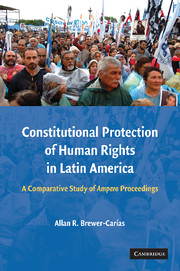 Constitutional Protection of Human Rights in Latin America
Constitutional Protection of Human Rights in Latin America Book contents
- Frontmatter
- Contents
- INTRODUCTION
- PART ONE THE CONSTITUTIONAL AND INTERNATIONAL DECLARATION OF HUMAN RIGHTS AND ITS JUDICIAL GUARANTIES
- Chapter One The Constitutional Declaration of Human Rights in Latin America and Its Internationalization
- Chapter Two Judicial Guaranties of the Declaration of Human Rights
- PART TWO THE AMPARO AS A LATIN AMERICAN CONSTITUTIONAL AND INTERNATIONAL LAW INSTITUTION
- PART THREE THE INJURED PARTY AND THE CONSTITUTIONAL RIGHTS PROTECTED BY MEANS OF THE AMPARO PROCEEDING
- PART FOUR THE INJURY, THE INJURING PARTY AND THE INJURING ACTS OR OMISSIONS IN THE AMPARO PROCEEDING
- PART FIVE THE EXTRAORDINARY CHARACTER OF THE AMPARO PROCEEDING
- CONCLUSION
- APPENDIX A List of Latin American Constitutions
- APPENDIX B List of Latin American Amparo Laws (Statutes)
- INDEX
Chapter One - The Constitutional Declaration of Human Rights in Latin America and Its Internationalization
Published online by Cambridge University Press: 08 August 2009
- Frontmatter
- Contents
- INTRODUCTION
- PART ONE THE CONSTITUTIONAL AND INTERNATIONAL DECLARATION OF HUMAN RIGHTS AND ITS JUDICIAL GUARANTIES
- Chapter One The Constitutional Declaration of Human Rights in Latin America and Its Internationalization
- Chapter Two Judicial Guaranties of the Declaration of Human Rights
- PART TWO THE AMPARO AS A LATIN AMERICAN CONSTITUTIONAL AND INTERNATIONAL LAW INSTITUTION
- PART THREE THE INJURED PARTY AND THE CONSTITUTIONAL RIGHTS PROTECTED BY MEANS OF THE AMPARO PROCEEDING
- PART FOUR THE INJURY, THE INJURING PARTY AND THE INJURING ACTS OR OMISSIONS IN THE AMPARO PROCEEDING
- PART FIVE THE EXTRAORDINARY CHARACTER OF THE AMPARO PROCEEDING
- CONCLUSION
- APPENDIX A List of Latin American Constitutions
- APPENDIX B List of Latin American Amparo Laws (Statutes)
- INDEX
Summary
THE SCOPE OF THE CONSTITUTIONAL DECLARATION
The practice of declaring rights in the text of the constitutions began with constitutionalism itself, and with the very notion of constitution as a superior law, with the first Declaration of Rights in constitutional history adopted by the Convention of Virginia in 1776, at the beginning of the independence process of the American colonies; a practice that was subsequently followed by the other colonies. Those rights declared in the Bill of Rights of those colonies were “natural rights” in the sense of being “inherent rights” to all men, who by nature were declared “equally free and independent.”
The first ten amendments to the 1789 U. S. Constitution, in force since 1791, also enumerated a few essential rights but the express statement that enumeration, “shall not be construed to deny or disparage other [rights] retained by the people” (IX), reinforcing the “declarative” character of the constitutional declaration of rights.
On August 26, 1789, one month before the approval of the first ten amendments to the U.S. Constitution, the French National Assembly at the beginning of the French Revolution also adopted the Declaration of the Rights of Man and of the Citizen, which was subsequently incorporated in the first French Constitution of 1791, recognizing and proclaiming all the fundamental rights of man, and particularly that “men are born and remain free and equal in rights,” “having natural and inalienable rights” that were not granted by political society, but rights inherent to the nature of human beings.
- Type
- Chapter
- Information
- Constitutional Protection of Human Rights in Latin AmericaA Comparative Study of Amparo Proceedings, pp. 13 - 61Publisher: Cambridge University PressPrint publication year: 2008
- 1
- Cited by


